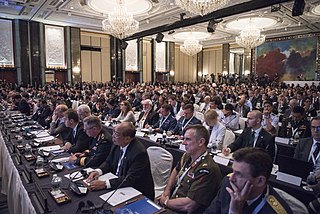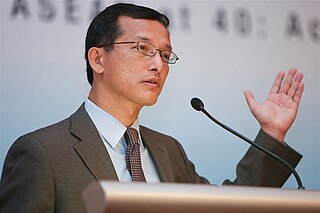Related Research Articles

Singapore maintains diplomatic relations with 189 UN member states. The three exceptions are the Central African Republic, Monaco and South Sudan.

The Association of Southeast Asian Nations, commonly abbreviated as ASEAN, is a political and economic union of 10 states in Southeast Asia. Together, its member states represent a population of more than 600 million people and land area of over 4.5 million km2 (1.7 million sq mi). The bloc generated a purchasing power parity (PPP) gross domestic product (GDP) of around US$10.2 trillion in 2022, constituting approximately 6.5% of global GDP (PPP). ASEAN member states include some of the fastest growing economies in the world, and the institution plays an integral role in East Asian regionalism.

The East Asia Summit (EAS) is a regional forum held annually by leaders of, initially, 16 countries in the East Asian, Southeast Asian, South Asian and Oceanian regions, based on the ASEAN Plus Six mechanism. Membership expanded to 18 countries including Russia and the United States at the Sixth EAS in 2011. Since its establishment, ASEAN has held the central role and leadership in the forum. EAS meetings are held after the annual ASEAN leaders' meetings, and plays an important role in the regional architecture of Asia-Pacific. The first summit was held in Kuala Lumpur, Malaysia on 14 December 2005.
The International Strategic Research Organization is an independent think-tank established in 2004. It pursues interdisciplinary studies on national and international political, economic and security issues.

The IISS Asia Security Summit: The Shangri-La Dialogue (SLD) is a "Track One" inter-governmental security conference held annually in Singapore by the Bahraini-funded think tank, the International Institute for Strategic Studies (IISS). The dialogue is commonly attended by defence ministers, permanent heads of ministries and military chiefs of mostly Asia-Pacific states. The forum's name is derived from the Shangri-La Hotel in Singapore, where it has been held since 2002.
The East Asian Community (EAC) is a proposed trade bloc for the East and Southeast Asian (ESEA) countries that may arise out of either ASEAN Plus Three or the East Asia Summit (EAS).

The Centre for Strategic and International Studies (CSIS) is a non-profit organization based in Indonesia which has served as a think tank on social, international, political and economical issues. CSIS was founded on Sept 1, 1971 by a group of Indonesian colleagues who hoped to promote public policy-oriented discussions in Indonesia. Founders of the organization included Harry Tjan Silalahi, Jusuf Wanandi, Hadi Soesastro, and Clara Joewono. It also had strong support from key figures close to the government at the time including generals Ali Moertopo, Soedjono Hoemardani, and Benny Moerdani. It was founded to give advice, ideas and support to government and other stakeholders such as parliament, political parties, businesses and NGOs and to reach out to the regional and international communities and to develop awareness of Indonesian policies and its state of development, while giving feedback to the Indonesian government on domestic and international developments.
The S. Rajaratnam School of International Studies (RSIS) is an autonomous graduate school and policy-oriented think tank of Nanyang Technological University (NTU) in Singapore. Founded in 1996 as the Institute of Defence and Strategic Studies (IDSS), RSIS offers graduate education in international affairs and strategic studies, taught by an array of international faculty. The school is named in honour of S. Rajaratnam, Singapore's former Deputy Prime Minister who had also been its longest-serving Foreign Minister. It is regarded as one of the best graduate schools for international studies in Asia.
The Third East Asia Summit was held in Singapore on November 21, 2007. The East Asia Summit (EAS) is a pan-Asia forum held annually by the leaders of 16 countries in the East Asian region. EAS meetings are held after annual ASEAN leaders' meetings.
The Lee Kuan Yew School of Public Policy is an autonomous postgraduate school of the National University of Singapore (NUS), named after the late former Prime Minister of Singapore, Lee Kuan Yew.

The Economic Research Institute for ASEAN and East Asia or ERIA is an international organization established in Jakarta, Indonesia in 2008 by a formal agreement among Leaders of 16 countries in the East Asian region to conduct research activities and make policy recommendations for further economic integration in the East Asia. ERIA works very closely with both the ASEAN Secretariat and 16 Research Institutes to undertake and disseminate policy research under the three pillars, namely “Deepening Economic Integration”, ”Narrowing Development Gaps”, and “Sustainable Development” and provide analytical policy recommendations to Leaders and Ministers at their regional meetings. ERIA provides intellectual contributions to East Asian Community building and serves as a Sherpa international organization. ERIA Ranks 9th among the world's "Top International Economics Think Tanks" according to the 2020 Global Go To Think Tanks Index Report conducted by the University of Pennsylvania.

Shankar P. Sharma, is a senior Economist and Diplomat who is currently serving as the Ambassador of Nepal to India. He was the Ambassador of Nepal to the United States from 2009-2014. Dr. Sharma served as the Vice-Chairman of the National Planning Commission from 2002 to 2006. He has a Ph.D. in economics from the University of Hawaii.

Noeleen Heyzer is a Singaporean social scientist, diplomat, and United Nations official who was the United Nations Special Envoy on Myanmar from October 2021 until June 2023.
The Comprehensive Economic Partnership for East Asia (CEPEA) is a Japanese led proposal for trade co-operation and free trade agreement among the 16 present member countries of the East Asia Summit. All those movements and efforts were taken over by the following Regional Comprehensive Economic Partnership.

The Ministry of Foreign Affairs of the Republic of Indonesia or commonly known by its abbreviation Kemlu, is an Indonesian government ministry responsible for the country's foreign politics and diplomacy. The ministry was formerly known as the Department of Foreign Affairs until 2008 when the nomenclature changed with the enactment of the 2008 State Ministry Act.

Simon Tay Seong Chee is a Singaporean lawyer and legal academic who served as a Nominated Member of Parliament between 1997 and 2003.

The enlargement of the Associationof Southeast Asian Nations is the process of expanding the Association of Southeast Asian Nations (ASEAN) through the accession of new member states. This process began with ASEAN's five original members, who founded the association through the signing of the Bangkok Declaration in 1967. Since then, the ASEAN's membership has grown to ten with the accession of Cambodia in 1999.

The ISEAS – Yusof Ishak Institute is a research institution and statutory board under the purview of the Ministry of Education in Singapore. It was established by an Act of Parliament in 1968.

The Forum for East Asia-Latin America Cooperation or is a regional forum of 36 countries constituting the region of East, Southeast Asia, Oceania, and Latin America that came together to form an official and regular dialogue channel between the two regions.
The East Asian Bureau of Economic Research (EABER) is a forum for economic research and analysis of the major issues facing the economies of East Asia.
References
- 1 2 Staff writer (2024). "Singapore Institute of International Affairs (SIIA)". UIA Global Civil Society Database. uia.org. Brussels, Belgium: Union of International Associations. Yearbook of International Organizations Online. Retrieved 24 December 2024.
- ↑ "Singapore Institute of International Affairs (SIIA)". Archived from the original on 2011-07-21. Retrieved 2011-06-10.
- ↑ "Singapore Institute of International Affairs: Research at the SIIA". Archived from the original on 2012-03-11. Retrieved 2019-02-19.
- ↑ Ball, Desmond and Kwa Chong Guan. "Assessing Track 2 Diplomacy in the Asia-Pacific Region, A CSCAP Reader" (PDF). Singapore: Strategic & Defence Studies Centre and S. Rajaratnam School of International Studies. Archived from the original (PDF) on 2013-03-01. Retrieved 2013-11-16.
- ↑ "SIIA Private Meeting with Secretary William Cohen, Co-Chairman of the CSIS US ASEAN Strategy Commission". Archived from the original on 2012-03-11. Retrieved 2019-02-19.
- ↑ "SIIA Private Meeting over Coffee with Dr. Kurt Campbell, US Assistant Secretary of State for East Asian and Pacific Affairs". Archived from the original on 2011-07-21. Retrieved 2019-02-19.
- ↑ "Dinner Dialogue hosted by H.E. Abdulaziz Aladwani, Ambassador, The Embassy of the State of Kuwait". Archived from the original on 2012-03-11. Retrieved 2019-02-19.